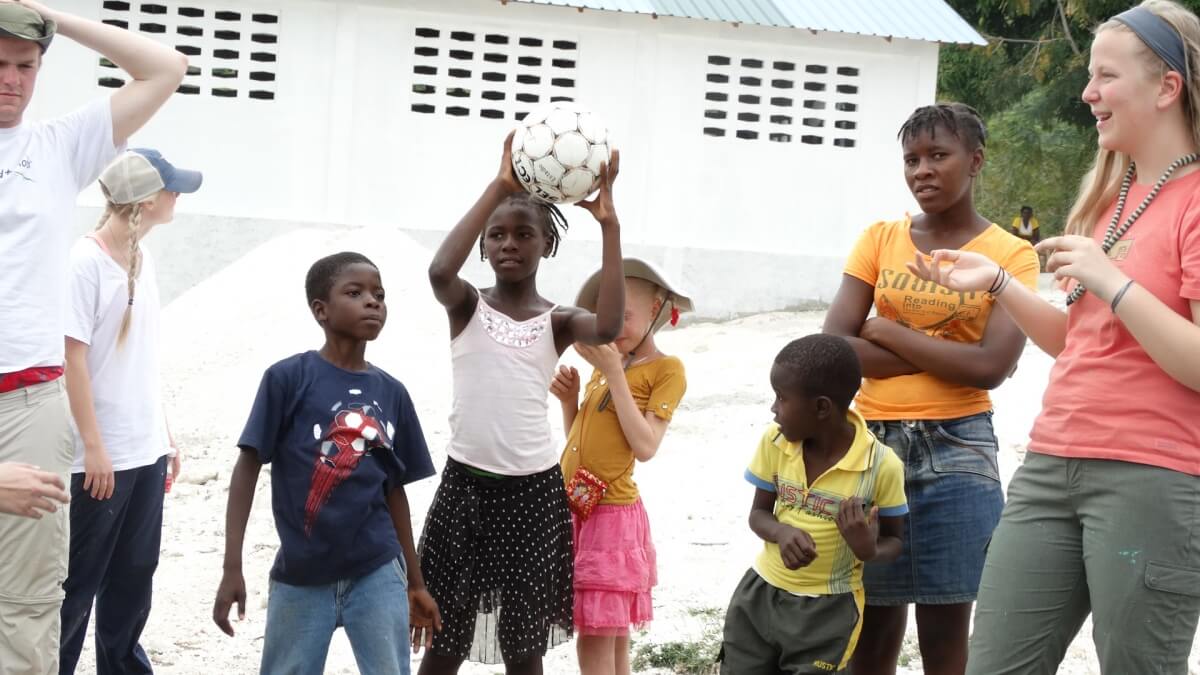by Charlie Wallace, CA ’18
 It was a shock landing in Port Au Prince from Miami. Immediately, it was blazing hot and people were standing all over. Driving through the capital city, it was obvious that these people were in poverty. Across the town, concrete walls with interesting writing and painting on them seemed to be everywhere. There was an abundance of trash littering the ground. The rubble and trash was overshadowed with the constant honks of the dangerous and aggressive motorcyclists. Women and men alike carried pounds and pounds of goods long distances.
It was a shock landing in Port Au Prince from Miami. Immediately, it was blazing hot and people were standing all over. Driving through the capital city, it was obvious that these people were in poverty. Across the town, concrete walls with interesting writing and painting on them seemed to be everywhere. There was an abundance of trash littering the ground. The rubble and trash was overshadowed with the constant honks of the dangerous and aggressive motorcyclists. Women and men alike carried pounds and pounds of goods long distances.
With this, Haiti has earned their name as the poorest country in the Western Hemisphere. The signs of poverty are obvious in Port Au Prince and the countryside alike. Animals and people live in terrible conditions. Horses, goats, dogs, and cats are tied up to trees or fences and are extremely malnourished. Through all of this sadness, there is a strong cultural identity in this country. People walk with pride and dignity, they wear vibrant colors, many paintings lined the streets of Port Au Prince, and people are kind.
This pride is shown through their laughs and smiles that are shown on every face. When we arrived in Nordette, these traits were still common. These children lived in the high mountains of Haiti, with very little resources. The community was bound by religion. People in church were excited. Nobody was bored with the many hours of long service. Everyone was singing, dancing, or at the least smiling.
Haitians do not feel fulfilled by material wealth, they feel fulfilled with the relationships they can make. They feel a strong need for education. I talked to young children who knew Spanish, French, English, and Creole. They were so grateful for the school that is being built, as well as the church that bands everyone together. Haiti has allowed me to start to break my Apollonian thinking, so I do not only measure success by material wealth. Haiti has shown me that Dionysian thinking will allow success to be measured on happiness and community. I hope that when I return to the country that I am so grateful to have been born in, I can remember these life lessons. I will cherish my memory of this enchanting place forever and hold my experiences near and dear to my heart. I cannot wait for the rest of my time in the enchanting and the unique country of Haiti.
by Kenneal Patterson, CA ’18
Upon observing the city of Port- Au- Prince on Google images, the first thing one notices is the obvious signs of poverty. In these pictures, people carry their goods upon their heads, they walk with dirt caked and torn shoes, and concrete rubble lines the street. I cannot lie and say that this isn’t true. Haiti is definitely a “third world county.”
But without visiting, people fail to understand the layers of complexity that lie beneath the stereotype of Haiti. I was enlightened upon the beauty of this country with every minute of my visit- from the vibrant colors of the stores, the interesting art painted on the walls, the broad smiles of the Haitian children, the constant whirlpool of the multitude of languages, the lively songs, and the effort to communicate. Every aspect of Haiti breathes life into the traveler, letting the person enter its very heart. Rather than the cold, stark, empty cities of America, where one often passes by someone with nothing more than a glance, the Haitian people greet you with exuberance, readiness, and excitement to learn.
The common misconception of an average American is that Haiti is a place that robs people of the value of life, but I believe in ways it is the opposite; Haiti creates a new way of living, a world where love and community is the core belief of the people and is applied with determination. Haitians have taken a place of great despair and built up from the ruins. But they do need our help.
Going to Haiti has given me a different perspective of the earth that we share. Why should someone born in the year that I was, and in many aspects extremely similar to me, have their life decided just because of the place that they were born? It’s true that Haitians are strong people, and find a way to deal with their hardships to make something beautiful, but everyone deserves a chance to have the privileges that others have the advantage to acquire. In the comfort of your own home, you are ignorant and blissful, unaware of the every day troubles many people face. To visit Haiti is to broaden your mind and expand your perspective. When you are privy to how others live, and respect their culture, but still keep in mind how we all share the element of our humanity, the world will improve just a little bit more.
